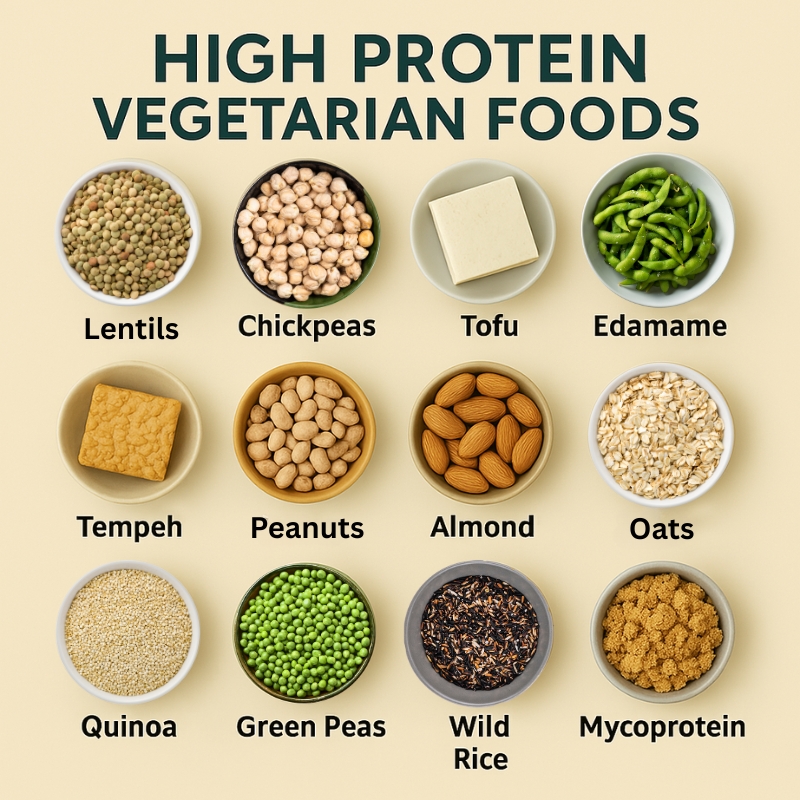Top 14 High Protein Vegetarian Foods You Must Know For Everyday Diet
Protein is the building block of your body and is essential for various bodily functions like muscle building, enzyme production, tissue repair, skin and hair health, etc. It is a myth that vegetarian foods do not provide enough protein. [1] It is not necessary that only meat-based diets provide ample protein. Legumes, quinoa, tofu, paneer, nuts, etc., are high protein vegetarian foods that fuel your body with essential nutrients when included in your diet. [2] Fitness enthusiasts can reach their goal with high protein vegetarian foods for muscle building that accelerate recovery and prepare them for strenuous workout routines. This read is about meeting your nutritional requirements while sticking to a diet containing high protein low fat vegetarian foods.
In This Article

Why Is Protein Essential In A Vegetarian Diet?
Protein is the building block of our body and is an essential component for everyone, irrespective of their food choices. It supports several bodily functions, such as the production of enzymes and hormones required for overall well-being. For vegetarians trying to lose weight while building clean eating habits, high protein, low carb vegetarian foods are the best choice as they help retain muscle mass, keep you satiated for a long time, prevent carb cravings, and boost metabolism. There are several high-protein vegetarian foods for muscle building, [3] which also offer balanced nutrition and help you achieve long-term, sustainable health and fitness goals.
Health Benefits of High-Protein Vegetarian Foods
Protein is highly essential for maintaining overall health. A protein source that provides the nine essential amino acids is a complete protein. Our body does not produce amino acids naturally; hence, we depend on protein-rich foods.
Here are the benefits of consuming high-protein vegetarian foods:
- Help Manage Weight: Our body burns calories to digest the food we eat and absorb the nutrients in it. This is termed the thermic effect. The thermic effect of protein is much higher than that of other nutrients. High-protein vegetarian foods boost metabolism and enhance fat burning. Including vegetarian foods high in protein and fibre helps healthy weight management. [4]
- Maintain Muscle Mass: Protein helps maintain muscle mass and strength, especially if you are into strength training. You need a high protein intake for strenuous physical activities and lifting heavy weights. Bodybuilders prefer high-protein vegetarian foods for muscle building to support their muscle-building goal. [5]
- Promote Satiety: High-protein vegetarian foods take longer for digestion, thus keeping you full for long, when compared to fats and carbohydrates. [6] This is because protein stimulates the production of peptide YY, the hormone that keeps you satiated, reducing the release of ghrelin, the hunger hormone.
- Provide Essential Nutrients: High-protein vegetarian foods provide essential nutrients such as amino acids, fibre, manganese, B Vitamins, Vitamin D and K, calcium, manganese, magnesium, and iron. [7]
- Boost Metabolism: High protein, low-fat vegetarian foods enhance the thermal effect, i.e., the body burns more calories for digestion. Protein helps maintain muscle mass, which consumes more energy than fat, even at rest. The increased metabolic rate supports weight loss, energy balance, and overall bodily function.
Top High-Protein Vegetarian Foods
There is a misconception that vegetarian foods cannot provide enough protein. But that is not true. Vegetarians need to plan their meals carefully so they can reach their daily protein requirement.
Here is a high-protein vegetarian food list:
- Lentils: Every 100 g of lentils provides 9 grams of protein. Including this in your high-protein, low-carb vegetarian foods list supports good bacteria in the colon and improves gut health. It also reduces the risk of heart disease and diabetes. [8]
- Chickpeas: If you are looking for high-protein, low-carb vegetarian foods for body building, then chickpeas can be a great addition to your plan for protein consumption. 100g of cooked chickpea contains 8 to 9 grams of protein. Chickpeas help maintain blood sugar levels, reduce belly fat, and lower blood pressure. [9]
- Tofu: Tofu is another nutritious option in a high-protein, low-carb vegetarian foods diet. Derived from soybeans and is considered a complete protein as it provides all the nine essential amino acids. Every 100g of tofu provides 17 g of protein. Tofu keeps you fuller for a long time and supports weight loss by reducing calorie intake.
- Edamame: Edamame is a high-protein vegetarian food derived from soybeans. A 100-gram bowl of edamame contains 11.5 g of protein. It is considered a complete protein as it provides the nine essential amino acids. It also has vitamin K, folate, and fibre and promotes digestive health.
- Tempeh: Tempeh is derived from fermented soybeans. It provides 19 g protein for every 100 gm serving and is one of the best high-protein, low-calorie vegetarian foods. Tempeh contains probiotics and promotes gut health.
- Beans: Beans are high-protein vegetarian foods for weight loss. 100 gms of cooked beans boasts 9 gms of protein. A diet rich in beans controls cholesterol levels and manages blood sugar and blood pressure levels. [10]
- Peanuts: 100 gms of peanuts provide 25.8 grams of protein. They make a rich inclusion to your protein-rich vegetarian foods diet. Peanuts are also a good source of healthy fats and fibre.
- Almonds: With 21 grams of protein in 100 gms almonds are among the best high-protein vegetarian foods. They are also rich in monounsaturated fats and help in maintaining heart health.
- Quinoa: Quinoa is a gluten-free grain and is considered the best high protein vegetarian foods. Every 185 g of cooked quinoa provides 8 gms of protein along with folate, zinc, magnesium, and iron. [11] It keeps you fuller and reduces calorie intake.
- Soy Milk: Soy milk made from soybeans is fortified with vitamins and minerals. Aside from this, it is also an excellent source of calcium, vitamin D, and vitamin B12. It is a healthy inclusion to a high protein diet foods vegetarian.
- Green Peas: Every 100 gms of cooked peas provides 6.6 grams of protein in addition to fibre, thiamine, folate, manganese, and vitamins C and K. Incorporating green peas into your high-protein foods for vegetarian diet boosts your overall well-being.
- Oats And Oatmeal: Oats and oatmeal are vegetarian foods high in protein and fibre. Every 100 gms of oats and oatmeal provides 13.5 grams of protein and 10.1 gms of fibre. [12] Oats and oatmeal are excellent weight-loss companions.
- Wild Rice: In contrast to white rice, wild rice is served along with the bran, making it a good source of protein, fibre, vitamins, and minerals. Every 100 gms serving of cooked wild rice contains 4 grams of protein, making it one of the essential high-protein foods for vegetarian diet
- Mycoprotein: Mycoprotein is derived from Fusarium venenatum, a type of fungus and is used in cutlets, fillets, and vegetable burger preparations. You derive 15 to 16 gms of protein and 5 to 6 gms of fibre from 100 gms of mycoprotein. It is a good non-animal-based protein addition to your high-protein vegetarian foods plan.
High Protein Vegetarian Meal Ideas
An easy protein vegetarian recipe is a welcome idea for individuals who must mindfully increase their protein and fiber rich foods to achieve their fitness goals. Here are a few easy-to-cook recipes that can be a delicious addition to your high-protein, low carb vegetarian foods.
- Teriyaki Tofu: Tofu marinated in teriyaki sauce is a flavourful dish served with broccoli and noodles. With a preparation time of 30 minutes, it is an excellent source of protein delivered through Tofu.
- Veggie Protein Chilli: Veggie protein chilli is a blend of vegetables such as bell pepper, carrot, celery, etc., stir-fried with onion and garlic and cooked in vegetable broth and chilli paste. The seasoning with avocado slices and cheddar cheese is what makes this recipe protein-rich.
- Vegetarian Ramen: Ramen noodles and mushrooms cooked in a flavoured vegetable broth topped with tofu, carrots, cooked spinach, and green onions; this vegetarian ramen is protein-rich due to tofu.
- Layered Aubergine And Lentil Bake: Lentils are cooked and seasoned with onion, garlic, and tomatoes, layered on baked aubergine slices, scattered with mozzarella cheese and baked once again to complete this delicious layered aubergine and lentil bake. With a cooking time of 45 minutes, the lentils and cheese in the recipe make it a high-protein addition to your diet.
How To Include High-Protein Vegetarian Foods In Your Daily Diet?
To include high-protein vegetarian foods in your daily diet, you should consciously add plant-based protein to every meal. Combine different protein sources such as tofu, cheese, lentils, beans, chia seeds, quinoa, etc. Prep your meals for the week so it is easier to manage. You can choose from options like lentil soup, stir-fried tofu noodles, mushroom chilli with sour cream, etc. A few other options include curds, quinoa poha, protein pancakes, etc., for breakfast, white beans and avocado sandwich, lentil bowls with greens, or vegan kale Caesar salad with tofu croutons, etc. for lunch, and your snacks can be nuts and seeds.
Takeaway
Protein content is high and easily available in non-vegetarian foods while vegetarians need to carefully plan their meals in order to achieve their daily protein requirement. There are plenty of high protein vegetarian foods. If meeting your protein goals with vegetarian meals is overwhelming, we recommend that you consult a nutritionist who can give you customised meal plans as per your health goals.
Frequently Asked Questions On High Protien Vegetarian Foods
The recommended daily protein intake for vegetarians is 0.8 grams for every kilo of body weight. For instance, if you weight 68 kg, you need 54 grams of protein per day.
Yes, you can. You need to plan your meals carefully and include a variety of plant-based food sources.
Yes. It is safe for vegetarians to have a high-protein diet. Every individual needs adequate protein to support various bodily functions.
Fatigue, brittle nails, oedema, muscle loss, hair loss, and low immunity are some common signs of protein deficiency.
To fulfil your protein requirement include lentils, beans, tofu, edamame, quinoa, and other plant-based protein sources.








